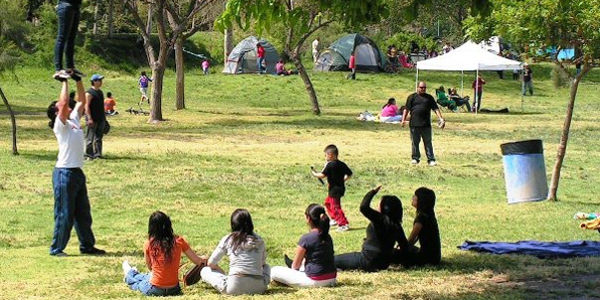With Palabras Indefinidas Y Negativas How Do You Know if It Is Plural or Masculine or Feminie
In these notes you will larn more virtually negative and affirmative words used in Spanish; including indefinite pronouns to mean nobody, nothing, someone, something, and many more than. Read the explanations and the example sentences advisedly to be ready to complete the exercises beneath to exercise and to examination yourself.
When we want to talk about an indefinite situation we use an affirmative word.
When nosotros want to talk about a negative state of affairs we use a negative discussion.
Alguno and ninguno must match the gender and number of the noun they replace or modify.
Note that alguno changes to algún when used earlier masculine singular nouns.
Similarly, ninguno changes to ningún when used before masculine singular nouns.
Note that if you are including the masculine noun you will use the words algún or ningún. If you are not including the masculine noun because it is already known, it was already mentioned, etc, yous use the form alguno and ninguno.
If a verb is preceded by "no" and then any words that follow must be negative. A double negative is required in Spanish when "no" precedes the verb:
However, if the negative discussion comes earlier the verb, we don't need to use "no".
Do 1: Look at the pictures and respond the questions with suitable words.
Ejercicio 1: Mira las fotos y responde las preguntas con las siguientes palabras.
Hints: ningún (x2), algunas, algunos, ninguna, siempre, nadie (x3).
Notation: Endeavor to use the right written accents if you can e.one thousand.: á, é, í, ó, ú, ñ, ü.
If you don't know the correct reply, type '?' to reveal it.

ane. ¿Hay alguna persona en el mar? - Sí hay  personas.
personas.
2. ¿Hay algún tiburón en el mar? - No, no hay  tiburón en el mar.
tiburón en el mar.
3. ¿Hay mucha gente en el verano? -  hay mucha gente en el verano.
hay mucha gente en el verano.

4. ¿Hay alguien en la playa? - No, no hay  en la playa.
en la playa.
five. ¿Algunas personas juegan en el mar? - No,  juega en el mar.
juega en el mar.

6. Me parece que no hay  joven en este parque.
joven en este parque.
7. Sí, hay  jóvenes en el parque. ¡Mira!
jóvenes en el parque. ¡Mira!
8.  mujer está usando vestido.
mujer está usando vestido.
9. ¿Alguien está comiendo? - No,  está comiendo.
está comiendo.
Exercise 2: Classify these words every bit affirmative or negative.
Ejercicio 2: Clasifica estas palabras como positivas o negativas
one. Algo
---
two. Nada
---
three. Alguien
---
4. Siempre
---
5. Nadie
---
6. Tampoco
---
7. Nunca
---
8. Ni
---
9. Alguno
---
10. También
---
11. Ninguno
---
Exercise three: Complete the Spanish sentence to mean the same equally the English language.
Ejercicio three: Lee las oraciones en inglés y completa las que están en español para que tengan el mismo significado.
Hints: alguien, alguno, algún, algunos, cipher, nadie, no, nunca, siempre, tambien, tampoco
Note: Effort to utilise the correct written accents if you tin can e.g.: á, é, í, ó, ú, ñ, ü.
If you don't know the right answer, type '?' to reveal it.

1. I do not have anything in my backpack. - No tengo  en mi mochila.
en mi mochila.
2. I always consume spaghetti. - Yo  como spaghetti.
como spaghetti.
iii. I never drive a Ferrari. - Yo  conduzco una Ferrari.
conduzco una Ferrari.
four. Nobody is dancing. -  está bailando.
está bailando.
5. Someone is knocking on the door. -  está golpeando la puerta.
está golpeando la puerta.
6. I like water ice-cream and I also similar chocolate. Me gusta el helado y  me gusta el chocolate.
me gusta el chocolate.
7. I have some books on the shelf. - Tengo  libros en el estante.
libros en el estante.
8. I don't have a blue car. -  tengo un auto azul.
tengo un auto azul.
nine. - Me neither. - Yo  .
.
Exercise iv: Cull the correct give-and-take.
Ejercicio 4: Elige la palabra correcta.

1. Visitaste alguna vez México? - No, he visitado México. 
2. ¿Hablas con tus amigos? - Sí, hablo con mis amigos. 
3. ¿Hay alguien que sepa hablar francés en la clase? - Sí, hay que sabe hablar francés. 
4. ¿ niño puede correr rápido? 
5. No, puede correr rápido. 
half dozen. vino a la fiesta, fue muy aburrida. 
7. Sí, y para comer. 
8. ¿No tienes los cuadernos? - No, y tengo el diccionario. 
9. ¿Vas a la escuela? - No, voy a la escuela, voy a la universidad. 
Practice 5: Complete with a suitable word
Ejercicio 5: Completa con una palabra adecuada.
Hints: algún, alguno, algunos, alguien, ningún, ninguna, nada, nadie, nunca.
1. La clase de matemáticas es muy difícil, no comprendo  .
.
2. Estoy asombrado,  había visto a una mujer tan bonita.
había visto a una mujer tan bonita.
3. Estoy muy triste porque  vino a mi fiesta.
vino a mi fiesta.
4. ¿Hay  que pueda leer la mente?
que pueda leer la mente?
v. ¿Hay  planeta llamado Capricornio?
planeta llamado Capricornio?
vi. ¡No! ¡No hay  planeta llamado Capricornio!
planeta llamado Capricornio!
7. No hay  que pueda volar como Superman.
que pueda volar como Superman.
8. Asombrosamente,  estudiante aprobó el examen porque no estudiaron.
estudiante aprobó el examen porque no estudiaron.
ix.  jóvenes quieren ir a la fiesta.
jóvenes quieren ir a la fiesta.
TRY A Costless TRIAL Course!
Click below to annals for a free class with no obligation - no credit card needed.
Prices as low equally merely $11 per hour for your outset purchase of lessons!
CLICK FOR YOUR FREE TRIAL CLASS!
harrelltinticulge.blogspot.com
Source: https://121spanish.com/affirmatives-and-negatives
0 Response to "With Palabras Indefinidas Y Negativas How Do You Know if It Is Plural or Masculine or Feminie"
Post a Comment